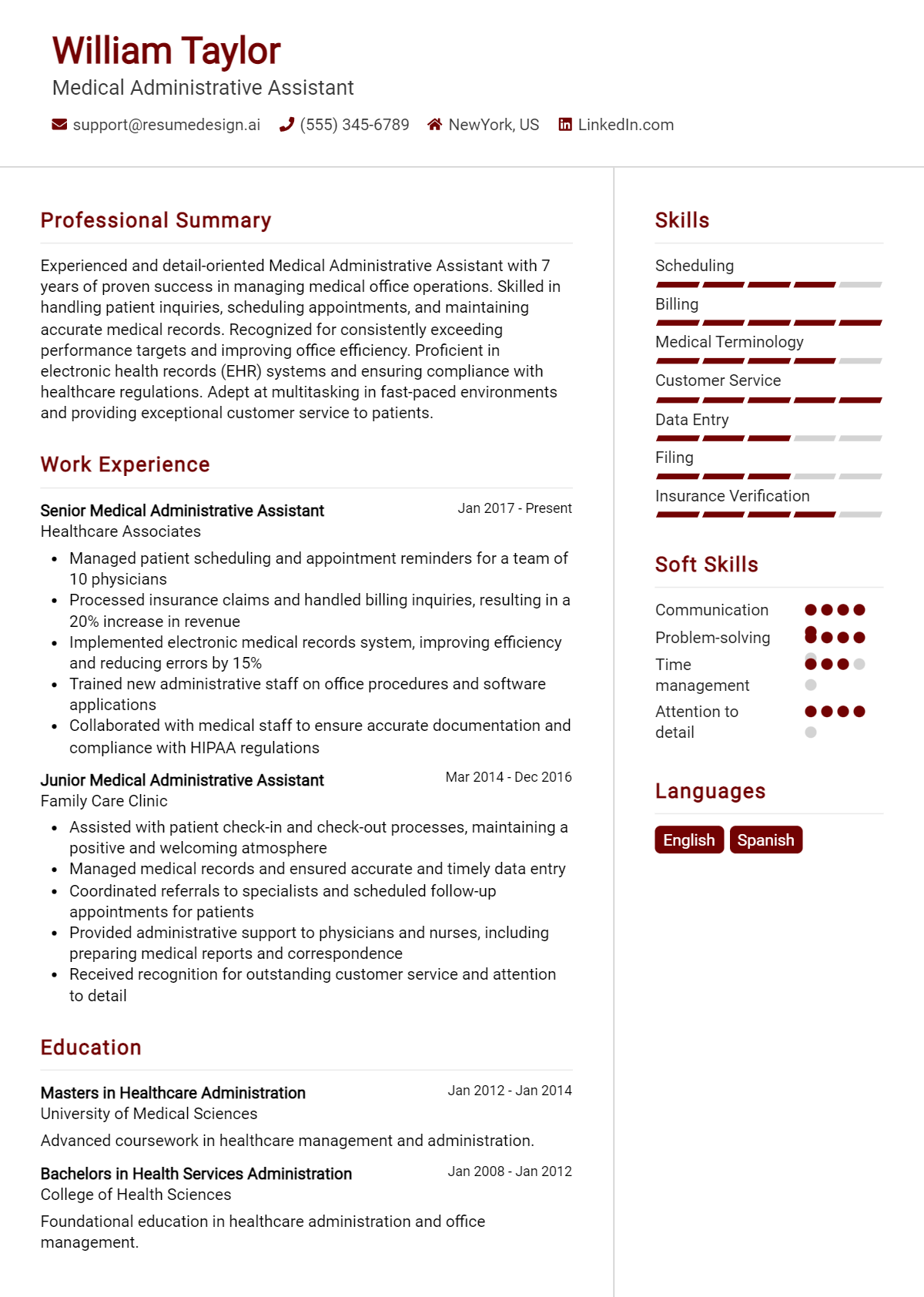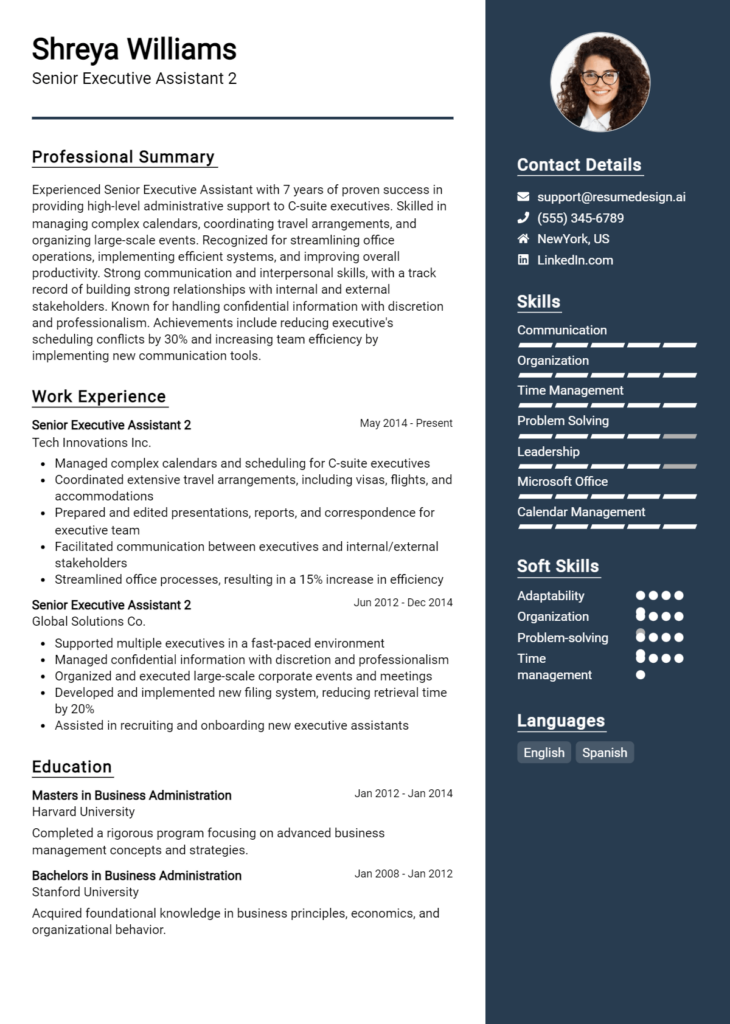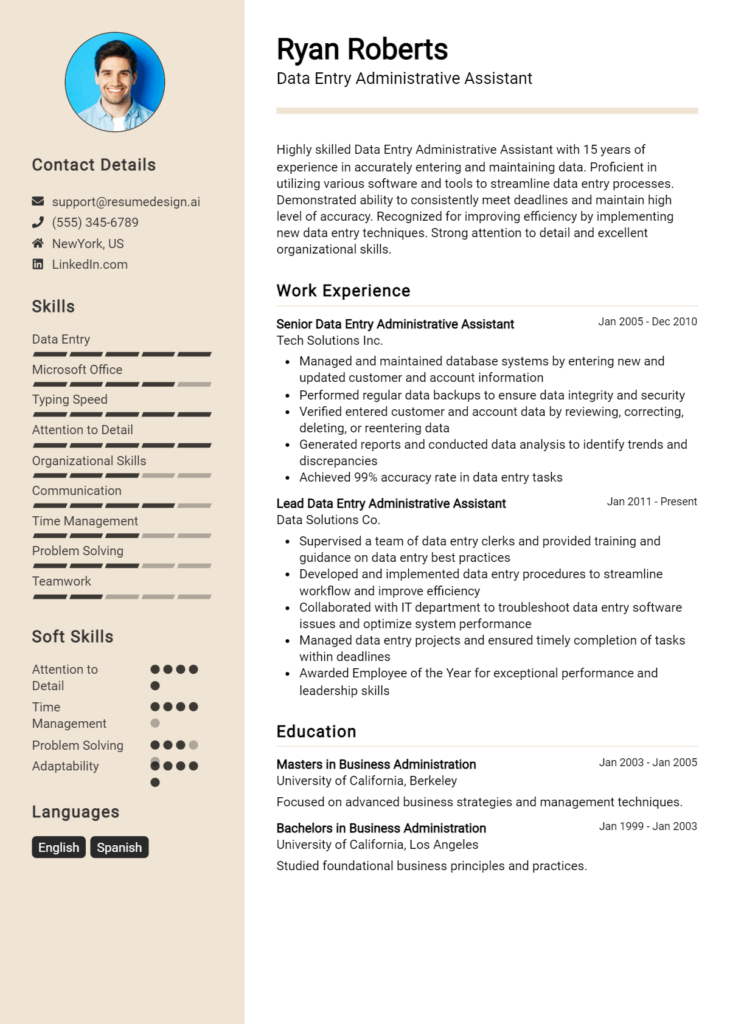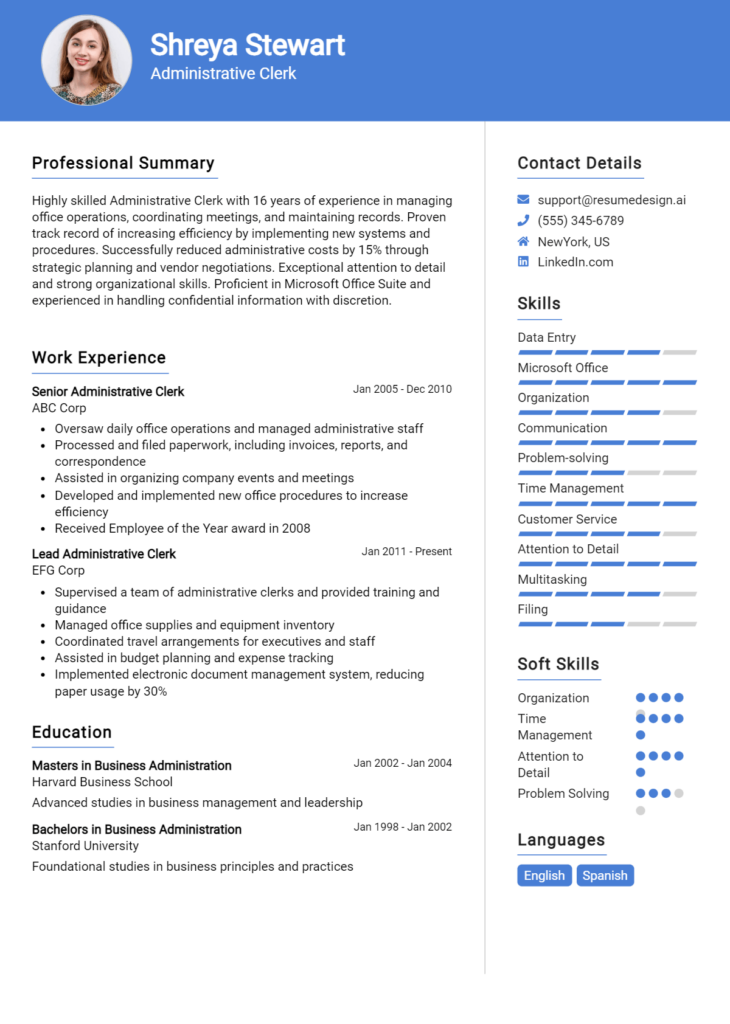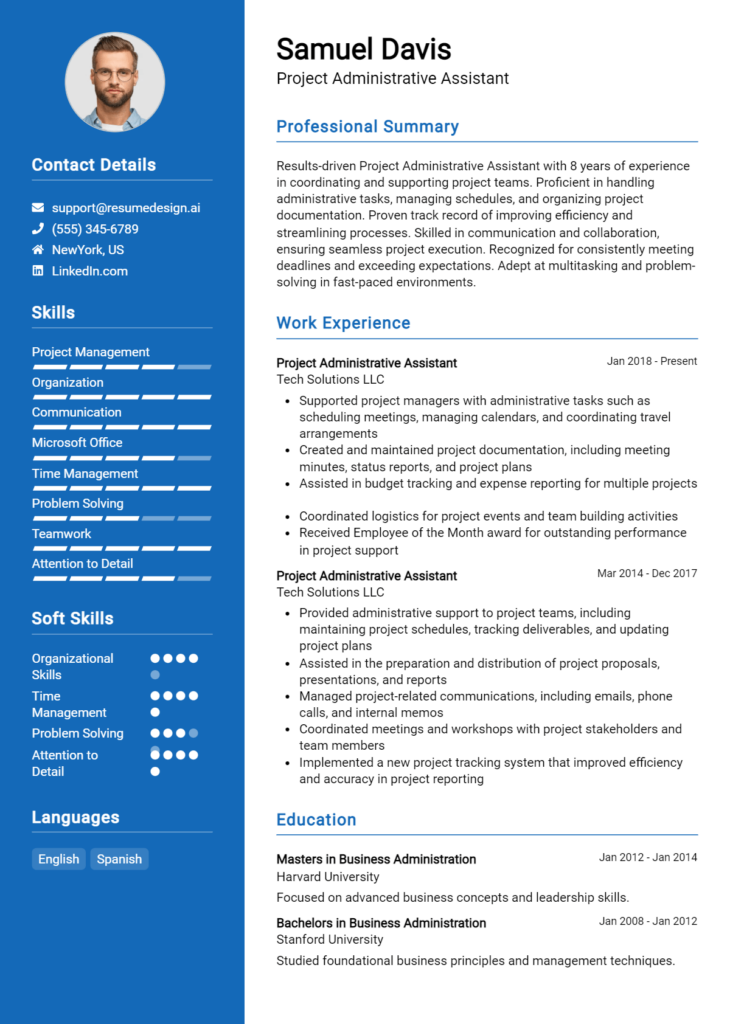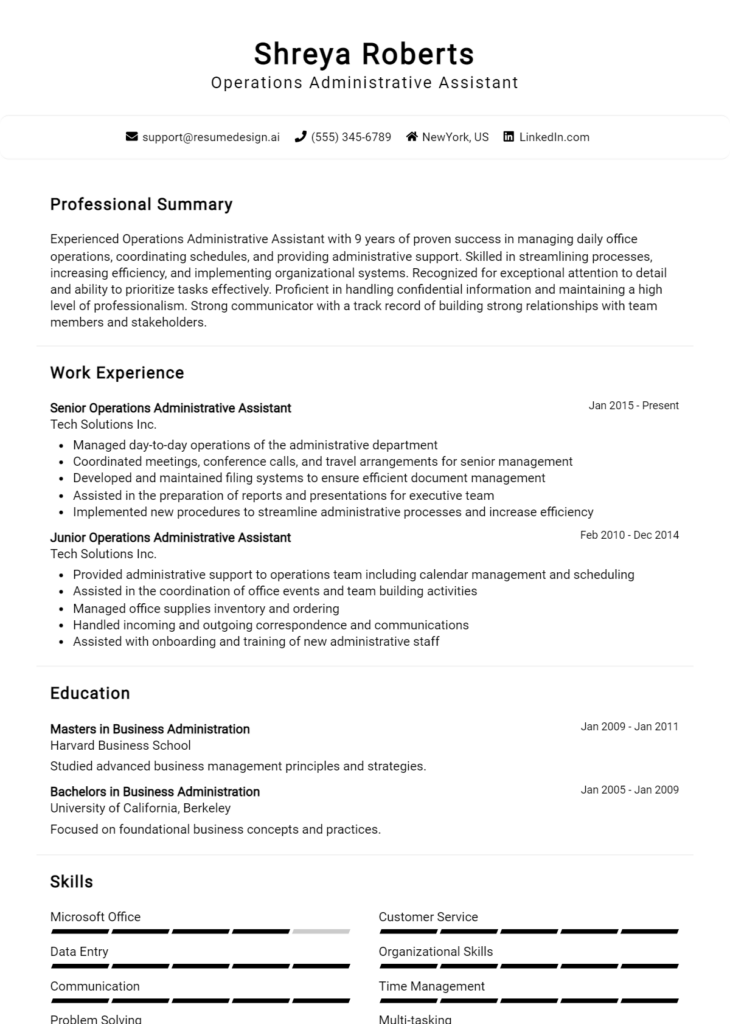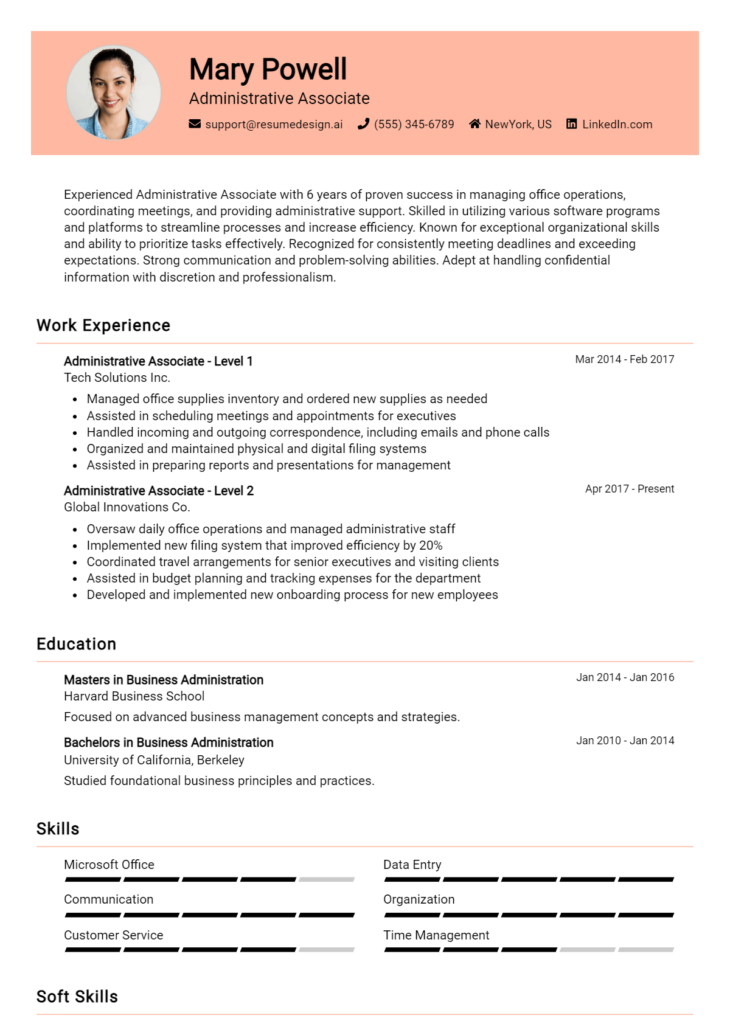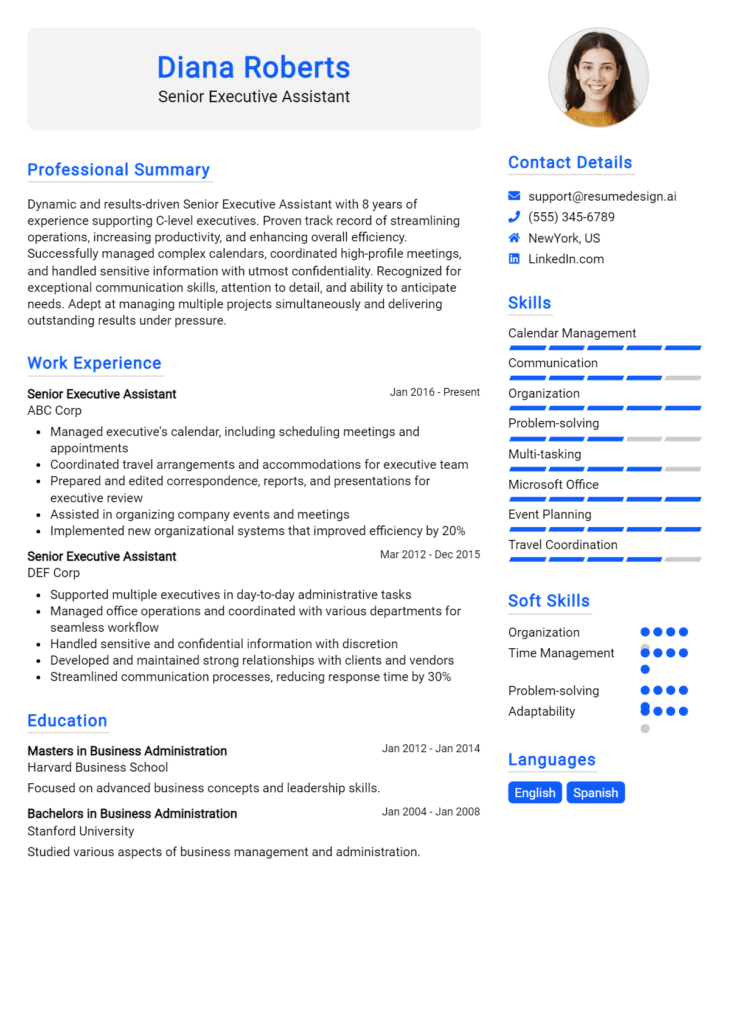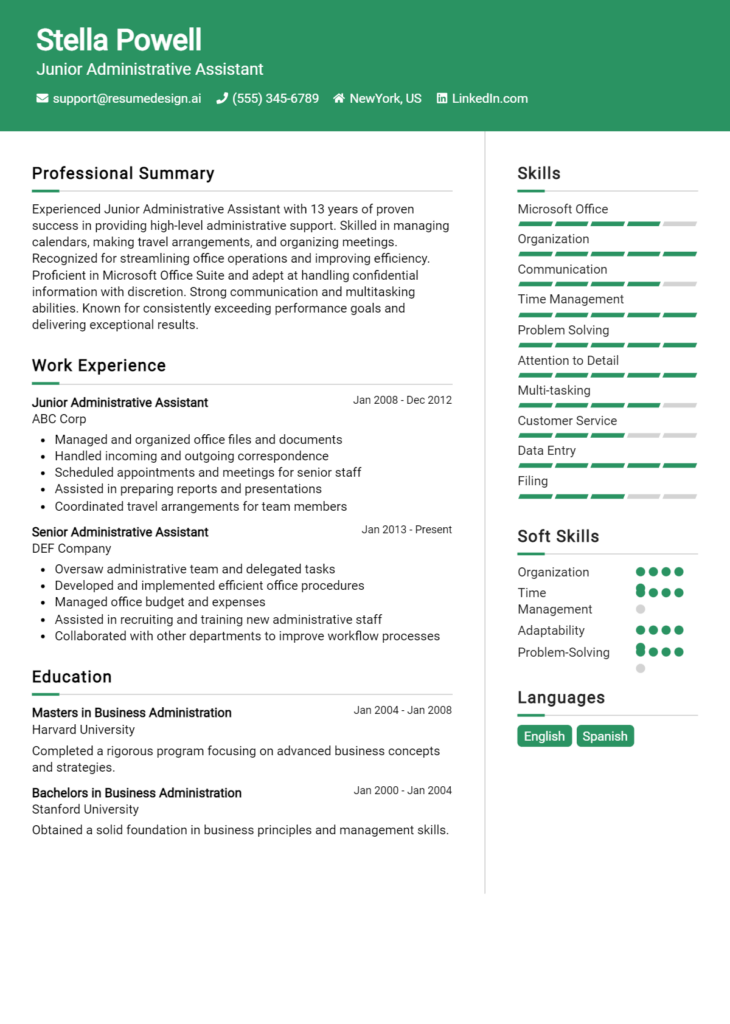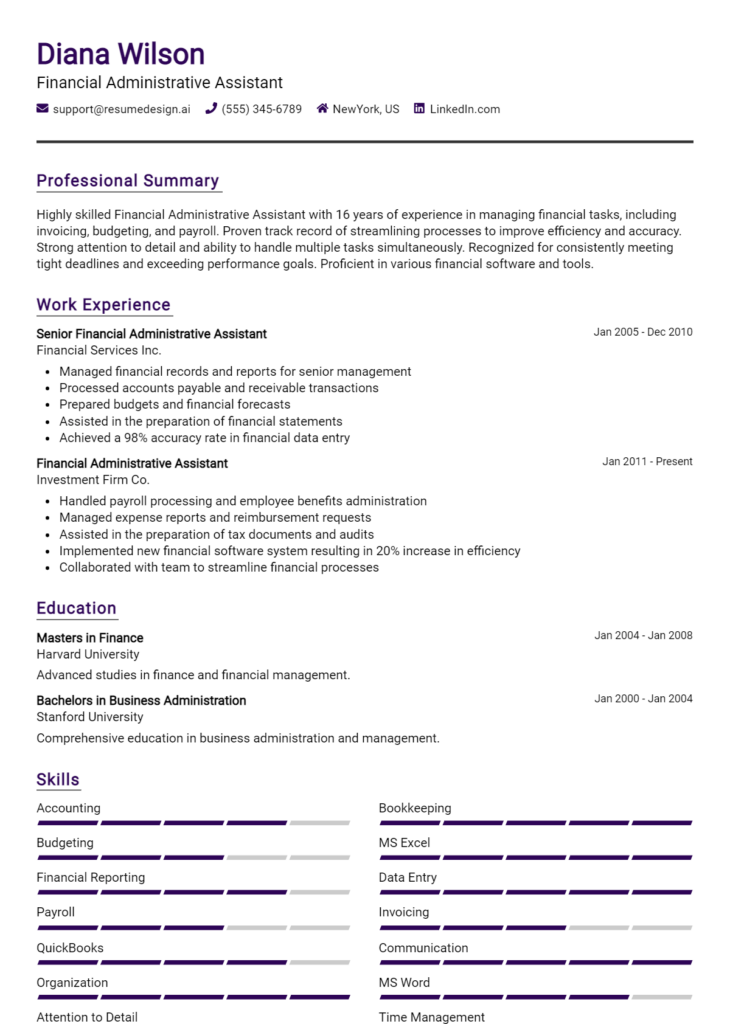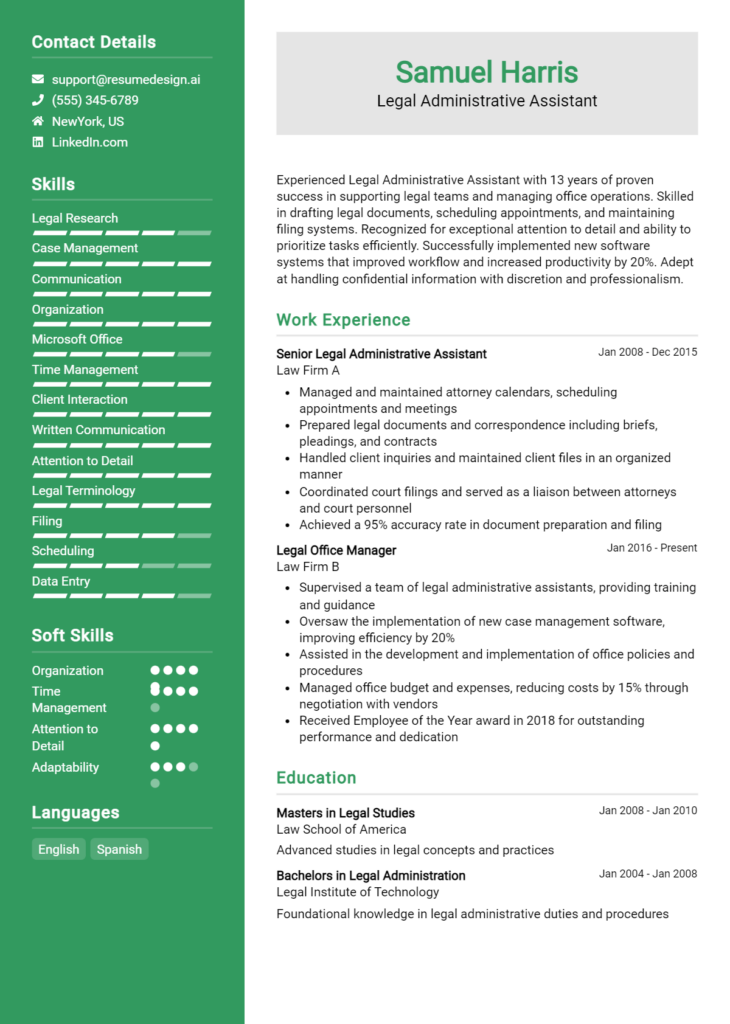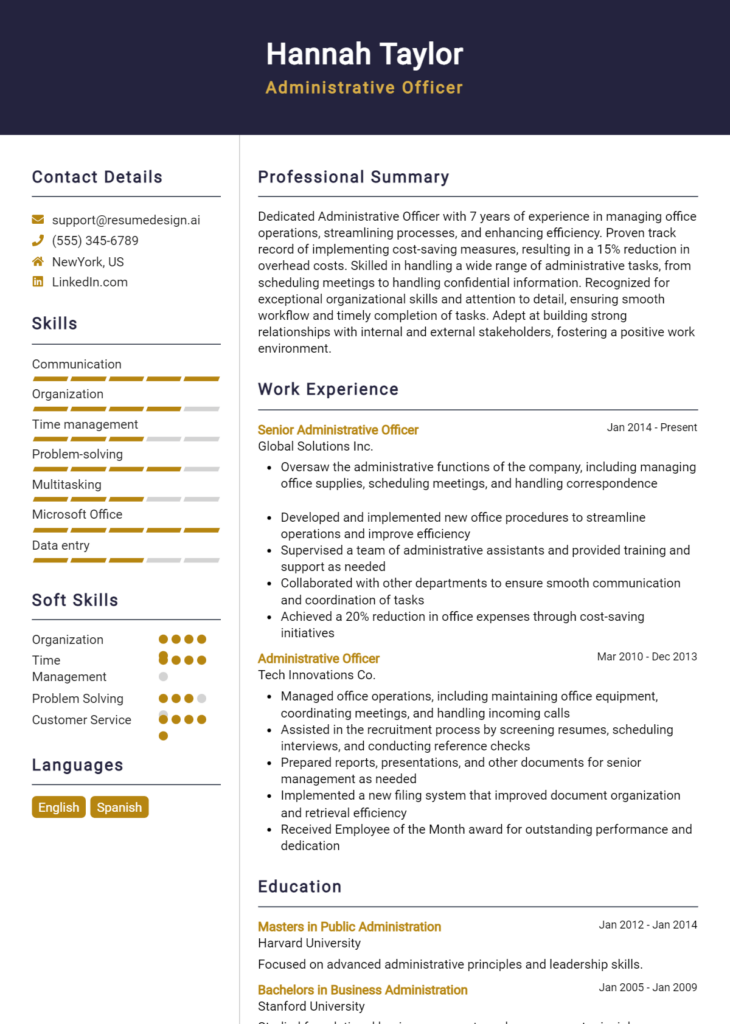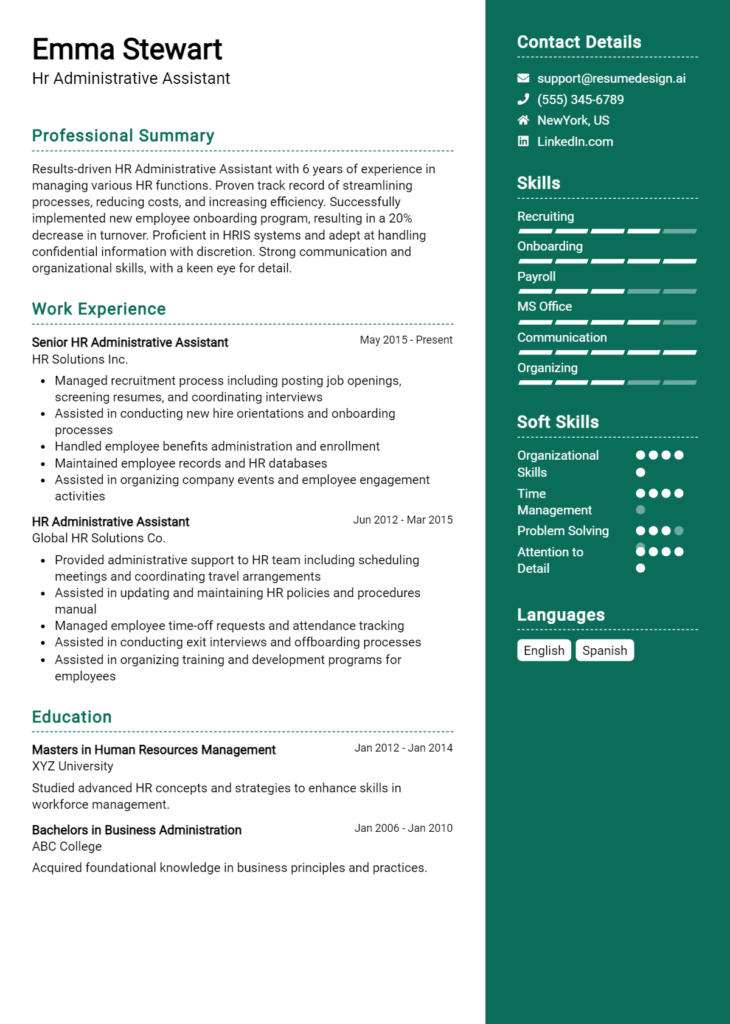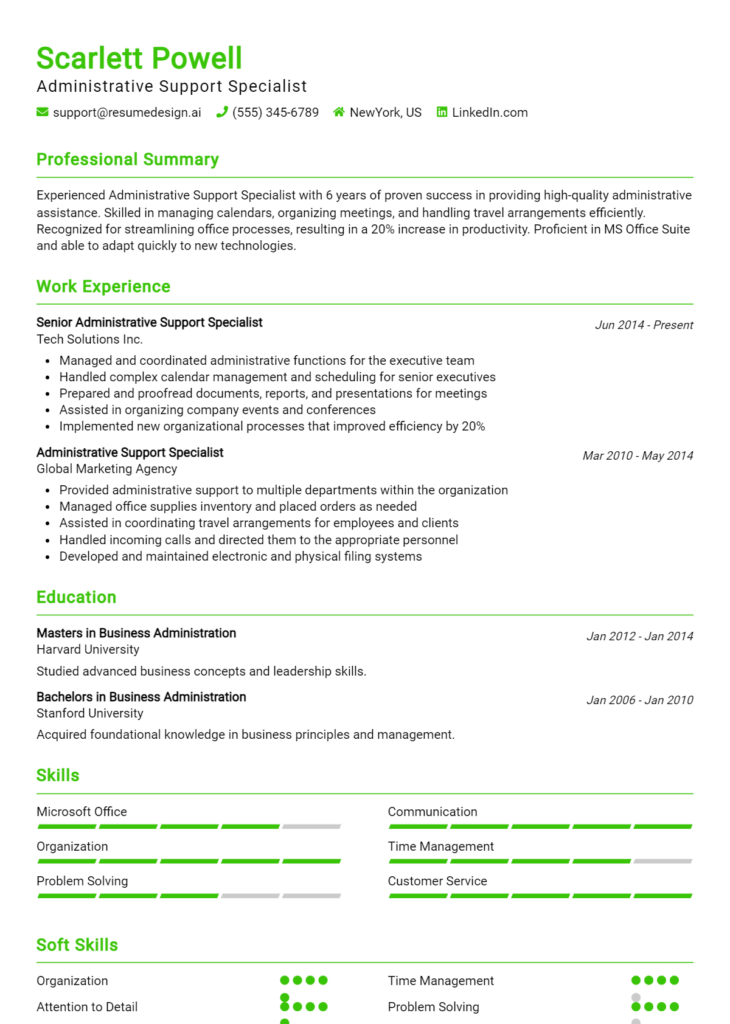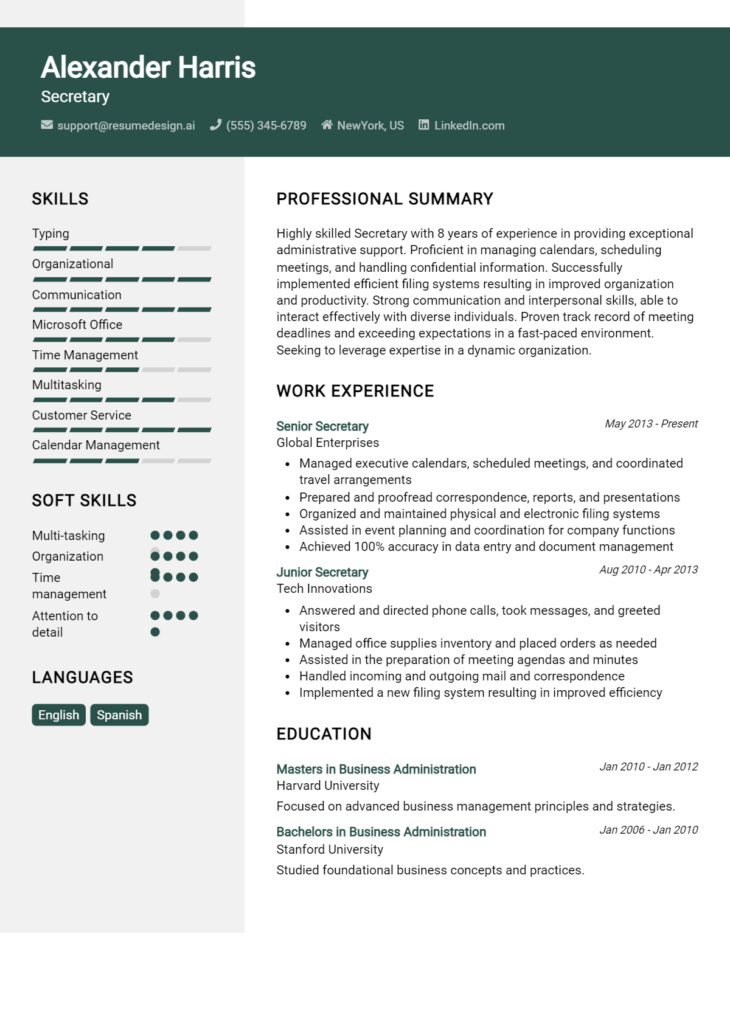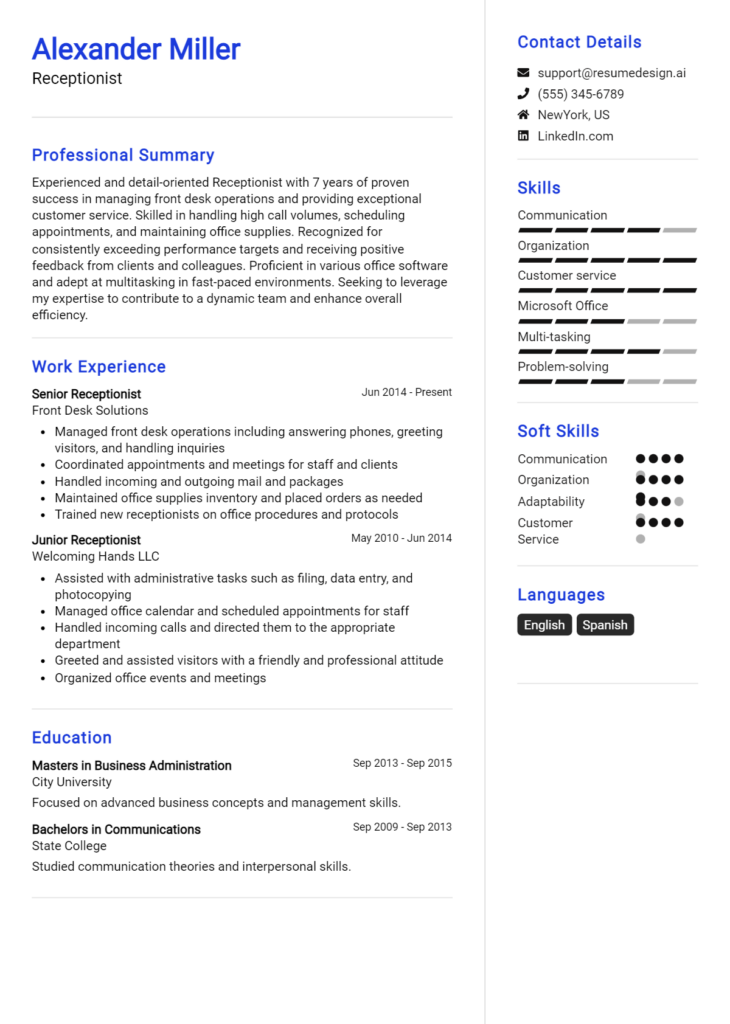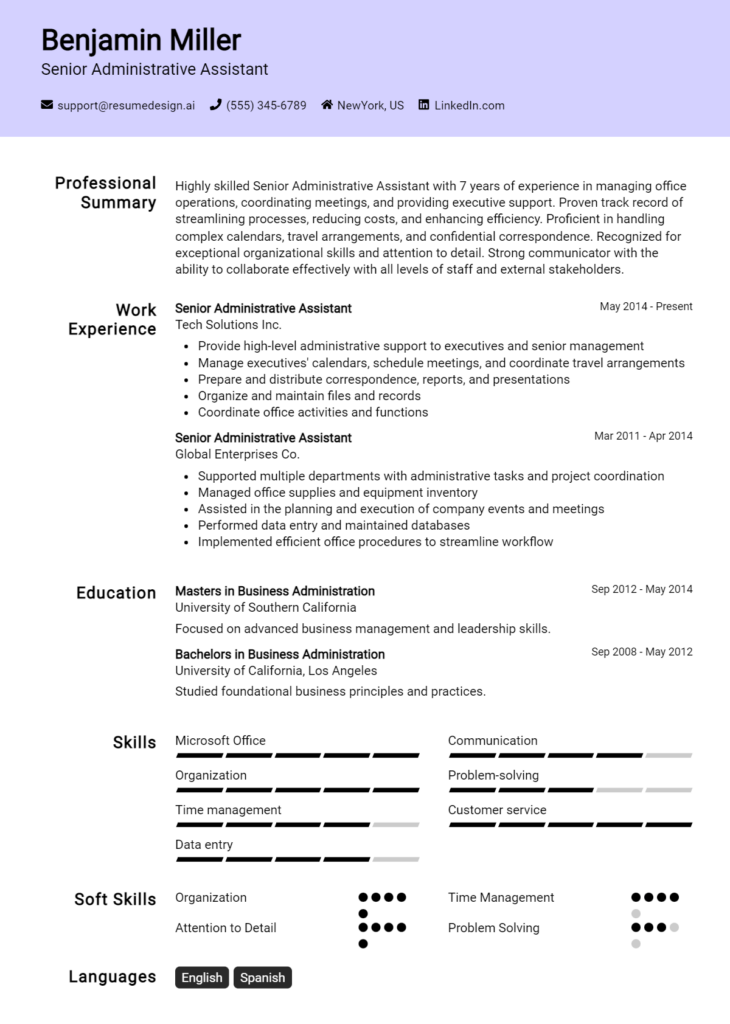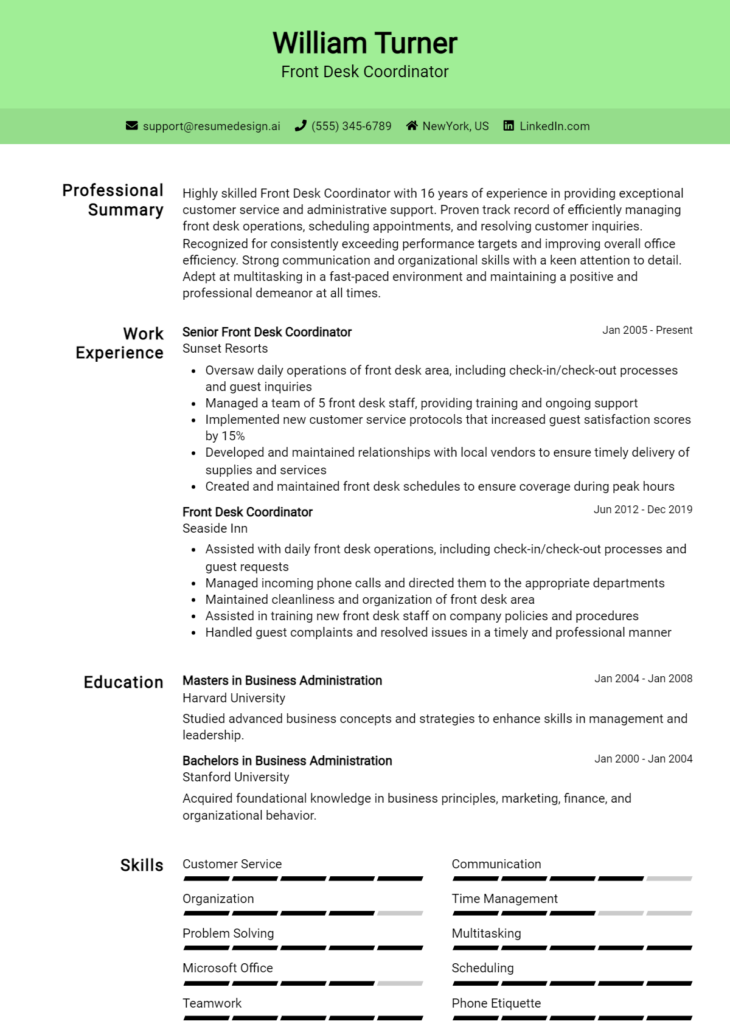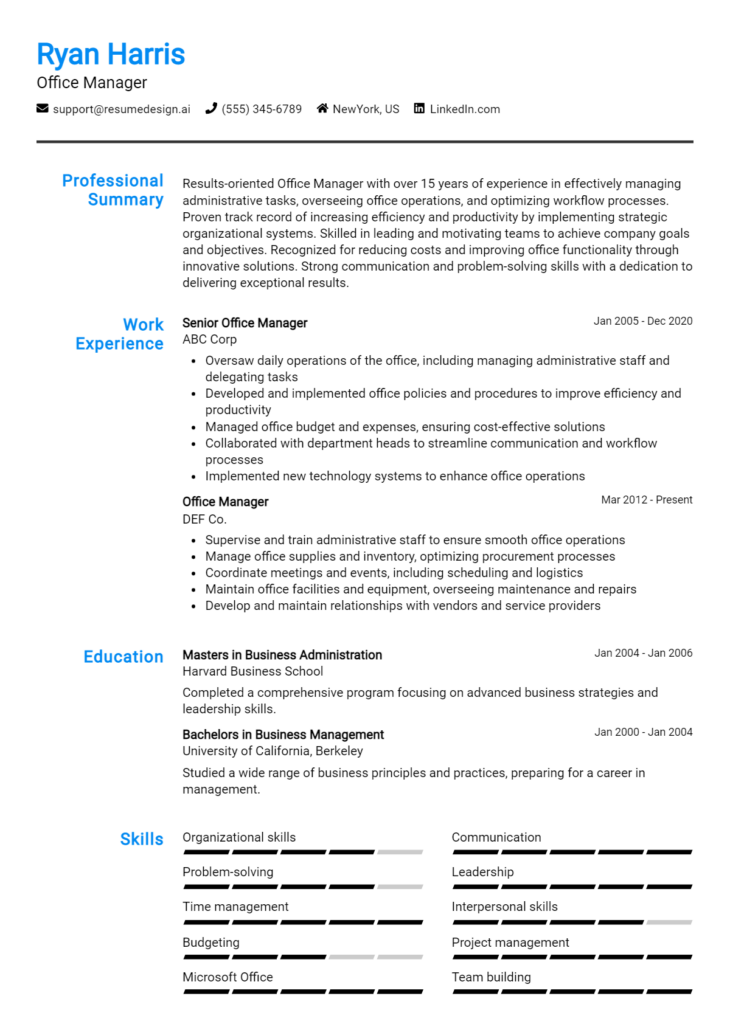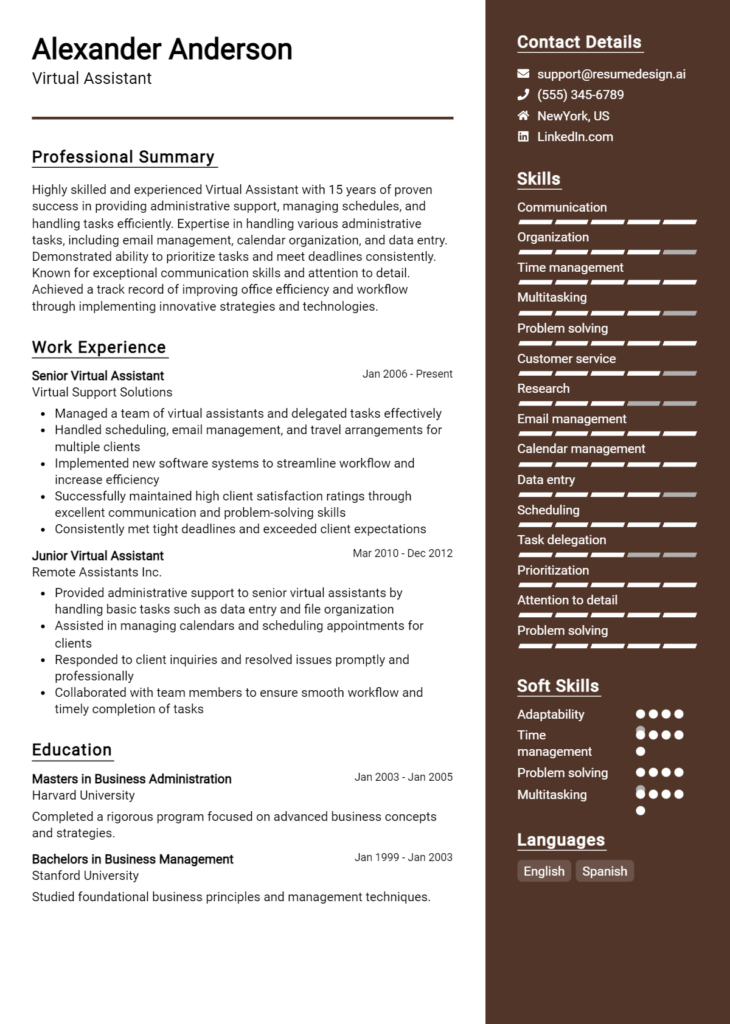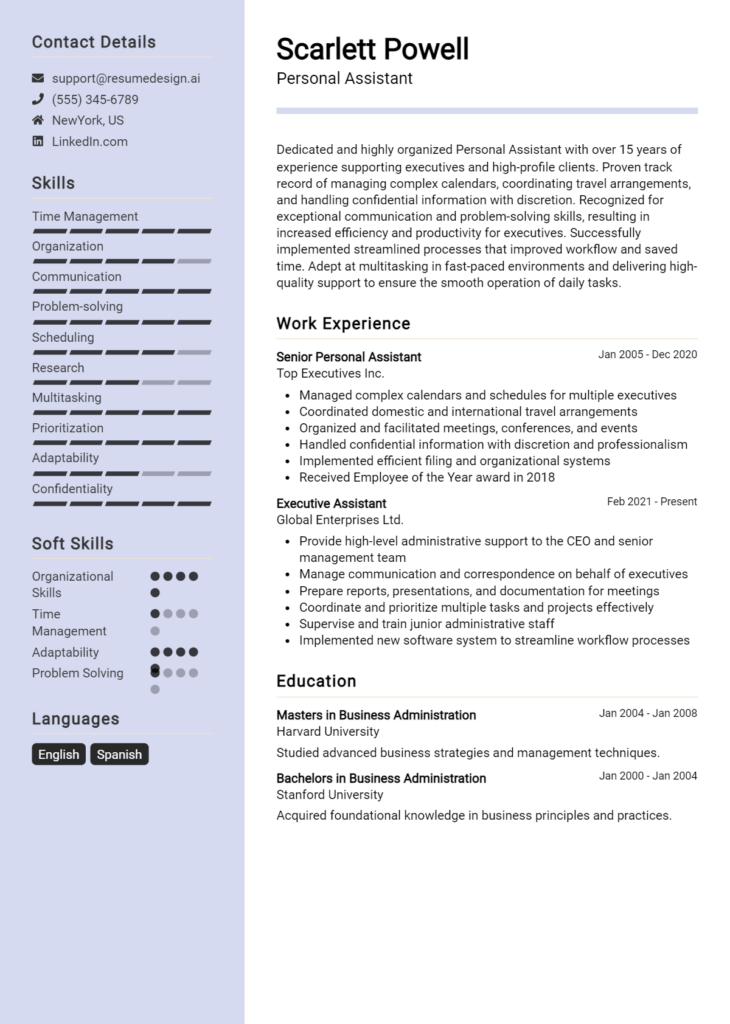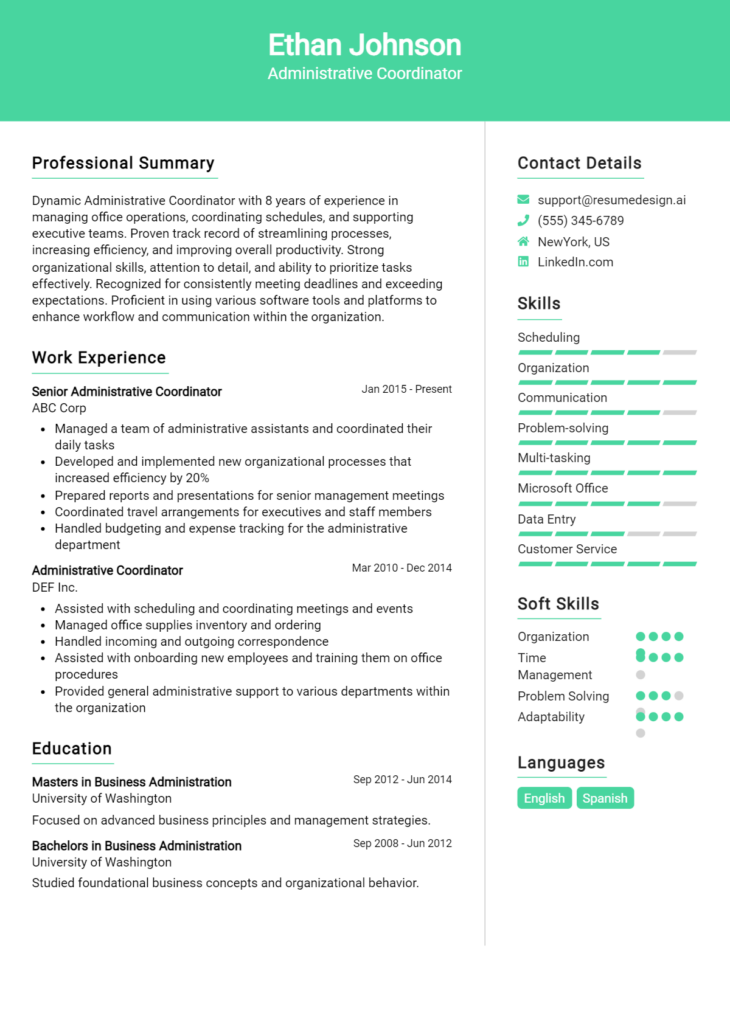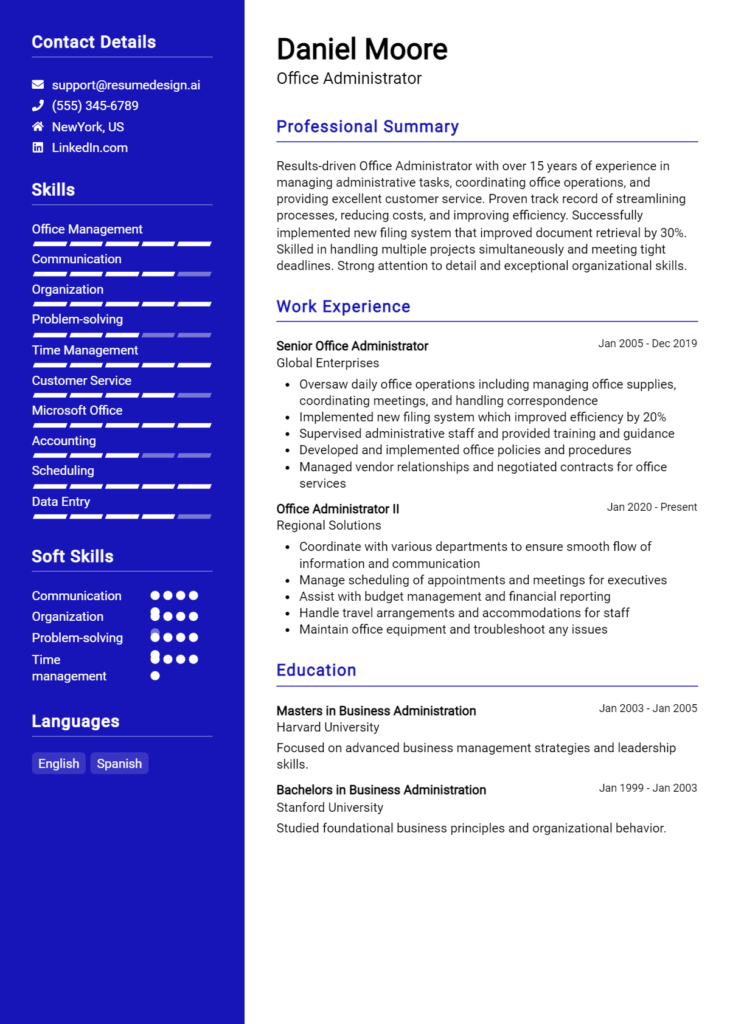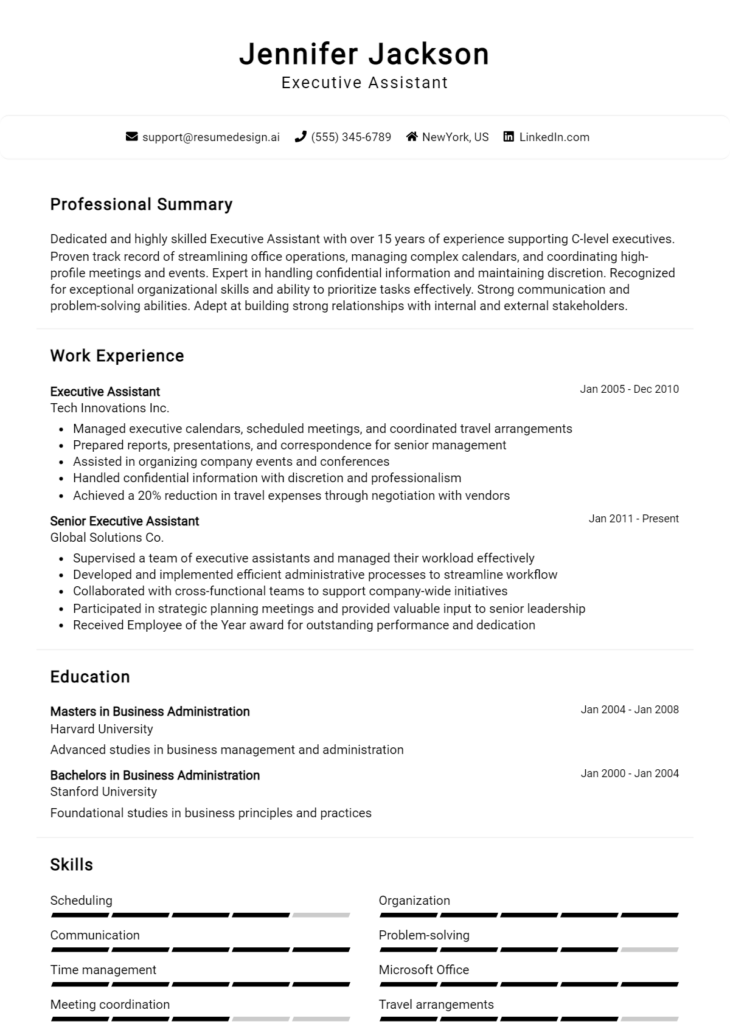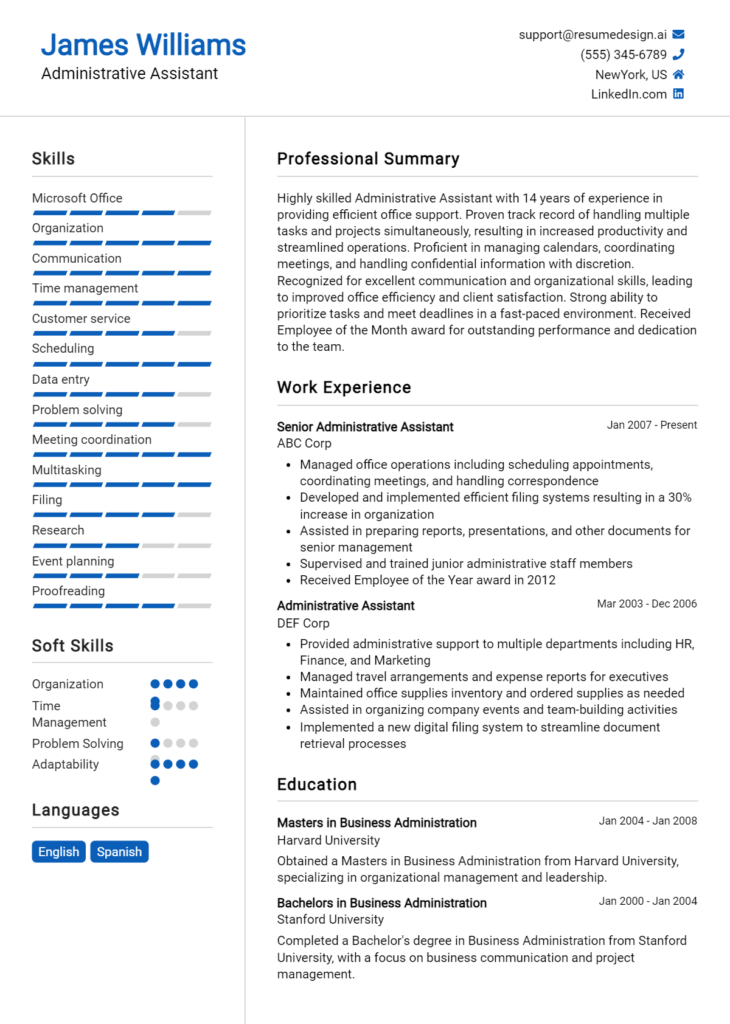Medical Administrative Assistant Core Responsibilities
A Medical Administrative Assistant plays a crucial role in healthcare settings, bridging various departments by managing patient records, scheduling appointments, and coordinating communications between medical staff and patients. Key responsibilities include handling billing and insurance processes, ensuring compliance with regulations, and maintaining a smooth operational workflow. Essential skills encompass technical proficiency in electronic health records, strong organizational abilities, and effective problem-solving skills. A well-structured resume highlighting these qualifications is vital for showcasing how these competencies contribute to organizational goals.
Common Responsibilities Listed on Medical Administrative Assistant Resume
- Managing patient scheduling and appointment reminders
- Maintaining and updating medical records and databases
- Handling billing, insurance claims, and payment processing
- Coordinating communication between patients and healthcare providers
- Ensuring compliance with healthcare regulations and policies
- Processing patient intake forms and documentation
- Assisting with administrative tasks such as filing and data entry
- Responding to patient inquiries and providing information
- Managing office supplies and inventory
- Assisting in the preparation of reports and presentations
- Training and onboarding new administrative staff
- Implementing and improving administrative procedures
High-Level Resume Tips for Medical Administrative Assistant Professionals
In the competitive field of healthcare administration, a well-crafted resume is essential for Medical Administrative Assistants seeking to make a strong impression on potential employers. Your resume is often the first glimpse hiring managers have of your professional identity, making it critical that it effectively reflects your skills, achievements, and understanding of the industry. A compelling resume can set you apart from the competition by highlighting your qualifications and demonstrating how you can contribute to a medical practice's success. This guide will provide practical and actionable resume tips specifically tailored for Medical Administrative Assistant professionals, ensuring that you present yourself in the best possible light.
Top Resume Tips for Medical Administrative Assistant Professionals
- Tailor your resume to the specific job description by incorporating relevant keywords and phrases.
- Highlight your experience in medical terminology, scheduling, and patient management to showcase your industry knowledge.
- Use quantifiable achievements to demonstrate your impact, such as the number of patients managed or improvements in office efficiency.
- Emphasize your proficiency with electronic health record (EHR) systems and other software used in medical settings.
- Include any certifications or training relevant to medical administration, such as CPR certification or a Medical Administrative Assistant diploma.
- Showcase your communication and interpersonal skills, as these are crucial in a patient-facing role.
- Keep your resume concise and focused, ideally fitting it onto one page while covering all critical points.
- Incorporate any volunteer work or internships in healthcare settings to demonstrate your commitment to the field.
- Use a clean, professional format that enhances readability and highlights important information effectively.
- Proofread your resume for spelling and grammatical errors to ensure it reflects your attention to detail.
By implementing these tips, you can significantly increase your chances of landing a job in the Medical Administrative Assistant field. A polished and targeted resume not only showcases your qualifications but also conveys your commitment to your role in supporting healthcare professionals and enhancing patient experiences.
Why Resume Headlines & Titles are Important for Medical Administrative Assistant
In the competitive field of healthcare administration, a well-crafted resume headline or title is crucial for a Medical Administrative Assistant. This succinct statement serves as the first impression of a candidate's qualifications, helping to capture the attention of hiring managers immediately. A strong headline summarizes key qualifications in one impactful phrase, allowing hiring managers to quickly assess the candidate's fit for the role. By being concise and directly related to the specific job being applied for, a compelling headline can differentiate candidates from the pool and set the tone for the rest of the resume.
Best Practices for Crafting Resume Headlines for Medical Administrative Assistant
- Be concise: Aim for one impactful phrase that summarizes your qualifications.
- Use role-specific keywords: Incorporate terms that reflect the job description to pass through applicant tracking systems.
- Highlight your strongest skills: Choose skills that are most relevant to the position.
- Showcase years of experience: If applicable, include your years of experience in the field.
- Include certifications: If you have relevant certifications, mention them in the headline.
- Make it action-oriented: Use strong verbs that convey your capabilities and contributions.
- Avoid jargon: Keep the language simple and clear to ensure it's easily understood.
- Tailor for each application: Customize your headline for every job you apply to, aligning it with the specific role.
Example Resume Headlines for Medical Administrative Assistant
Strong Resume Headlines
Detail-Oriented Medical Administrative Assistant with 5 Years of Experience in Patient Care Coordination
Certified Medical Administrative Assistant with Proven Skills in Medical Billing and Scheduling
Efficient Medical Office Professional Specializing in Patient Relations and Healthcare Compliance
Weak Resume Headlines
Looking for a Job in Healthcare
Experienced Worker
The strong headlines are effective because they clearly communicate the candidate's relevant experience, skills, and qualifications in a way that directly relates to the role of a Medical Administrative Assistant. They are specific, engaging, and tailored to showcase the candidate's strengths. In contrast, the weak headlines fail to impress because they are vague and non-specific, leaving hiring managers with no indication of the candidate’s suitability for the role. A generic statement does not highlight any unique skills or experiences, making it easy to overlook in a competitive job market.
Writing an Exceptional Medical Administrative Assistant Resume Summary
A well-crafted resume summary is crucial for a Medical Administrative Assistant as it serves as the first impression for hiring managers. This brief yet impactful section encapsulates the candidate's key skills, relevant experience, and notable accomplishments, allowing them to quickly gauge the applicant's fit for the role. A strong summary is concise, tailored to the specific job description, and designed to capture attention, setting the stage for the rest of the resume. It not only highlights the candidate's qualifications but also conveys their enthusiasm and alignment with the organization's goals.
Best Practices for Writing a Medical Administrative Assistant Resume Summary
- Quantify Achievements: Use numbers and specific metrics to demonstrate the impact of your work.
- Focus on Relevant Skills: Highlight skills that are directly applicable to the job description.
- Tailor for Each Job: Customize your summary for every position you apply for, reflecting the specific requirements mentioned in the job posting.
- Keep it Concise: Aim for 3-5 sentences that deliver maximum information without being overly wordy.
- Use Action Verbs: Start sentences with strong action verbs to convey confidence and proactivity.
- Showcase Soft Skills: Include interpersonal skills that are essential for effective communication in a medical setting.
- Highlight Relevant Experience: Summarize your professional background and any specialized training that pertains to the role.
- Express Your Passion: Convey enthusiasm for the healthcare industry and your commitment to patient care.
Example Medical Administrative Assistant Resume Summaries
Strong Resume Summaries
Detail-oriented Medical Administrative Assistant with over 5 years of experience in managing patient records and scheduling appointments. Successfully reduced appointment cancellations by 30% through effective communication and follow-ups, ensuring a smoother workflow in a busy practice.
Dedicated administrative professional skilled in electronic health record management and insurance verification. Proven track record of improving patient satisfaction scores by 20% by implementing streamlined check-in processes and providing exceptional customer service.
Highly organized Medical Administrative Assistant with expertise in medical billing and coding. Achieved a 99% accuracy rate in billing submissions, contributing to a 15% increase in revenue for the practice within one year.
Weak Resume Summaries
Experienced administrative assistant looking for a job in the medical field.
I have worked in various office settings and have some skills that might be useful in a medical environment.
The strong resume summaries are effective because they provide specific details about achievements and skills that directly relate to the Medical Administrative Assistant role. They quantify results, demonstrate relevant experience, and convey a sense of professionalism and capability. In contrast, the weak summaries lack specificity, measurable outcomes, or a clear connection to the job, making them less compelling to hiring managers.
Work Experience Section for Medical Administrative Assistant Resume
The work experience section of a Medical Administrative Assistant resume is a critical component that highlights the candidate's technical skills, ability to manage teams, and capacity to deliver high-quality results in a fast-paced healthcare environment. This section serves as a window into the candidate's professional history, showcasing their expertise in areas such as patient scheduling, record management, and compliance with healthcare regulations. By quantifying achievements and aligning past experiences with industry standards, candidates can effectively demonstrate their value to potential employers and set themselves apart from the competition.
Best Practices for Medical Administrative Assistant Work Experience
- Use action verbs to describe responsibilities and achievements.
- Quantify results whenever possible to demonstrate impact (e.g., "increased patient satisfaction by 20%").
- Highlight relevant technical skills, such as proficiency with electronic health record (EHR) systems.
- Include examples of teamwork and collaboration in achieving departmental goals.
- Tailor experiences to align with job descriptions and essential qualifications for the position.
- Focus on outcomes that directly benefit the organization, such as cost savings or efficiency improvements.
- Keep descriptions concise and focused on specific achievements.
- Showcase any leadership roles or responsibilities that demonstrate your capability to manage others.
Example Work Experiences for Medical Administrative Assistant
Strong Experiences
- Coordinated a team of 5 administrative staff to streamline patient intake processes, resulting in a 30% reduction in wait times and a 25% increase in patient satisfaction scores.
- Implemented a new electronic health record (EHR) system that improved data retrieval efficiency by 40%, leading to enhanced patient care and compliance with regulations.
- Managed scheduling for a busy outpatient clinic, successfully optimizing appointment slots which increased patient throughput by 15% without compromising care quality.
- Conducted staff training sessions on HIPAA regulations and office protocols, achieving a 100% compliance rate during external audits.
Weak Experiences
- Helped with patient scheduling and other administrative tasks.
- Worked in a medical office and assisted with various duties.
- Handled patient inquiries and provided information when needed.
- Was part of a team that completed paperwork for patients.
The examples labeled as strong showcase specific, quantifiable achievements and demonstrate the candidate's ability to lead and collaborate effectively. They highlight clear outcomes that align with the responsibilities of a Medical Administrative Assistant. In contrast, the weak experiences lack detail and impact, failing to convey the candidate's contributions or effectiveness in their role. By focusing on measurable results and specific skills, strong experiences provide a compelling narrative that can capture the interest of hiring managers.
Education and Certifications Section for Medical Administrative Assistant Resume
The education and certifications section of a Medical Administrative Assistant resume plays a crucial role in demonstrating the candidate's qualifications and commitment to the healthcare field. This section not only outlines the academic background of the applicant but also showcases industry-relevant certifications and ongoing learning endeavors. By providing information on relevant coursework, specialized training, and recognized certifications, candidates can significantly enhance their credibility and improve their alignment with the specific requirements of the job role, making them more appealing to potential employers.
Best Practices for Medical Administrative Assistant Education and Certifications
- Include only relevant degrees and certifications that directly relate to medical administration.
- List the most recent education first, along with the institution's name and graduation date.
- Highlight any industry-recognized certifications, such as Certified Medical Administrative Assistant (CMAA) or Registered Medical Assistant (RMA).
- Provide details on specialized training or workshops that enhance your skills in medical software or patient management.
- Incorporate relevant coursework that showcases your knowledge in areas like medical terminology, billing, and coding.
- Maintain a clear and concise format, using bullet points for easy readability.
- Be honest about your qualifications, avoiding exaggeration or misleading information.
- Consider including memberships in professional organizations that emphasize your dedication to the field.
Example Education and Certifications for Medical Administrative Assistant
Strong Examples
- Associate Degree in Medical Administration, XYZ Community College, May 2022
- Certified Medical Administrative Assistant (CMAA), National Healthcareer Association, June 2023
- Coursework in Medical Coding and Billing, ABC Institute, Completed December 2021
- Certified Electronic Health Records Specialist (CEHRS), National Healthcareer Association, January 2023
Weak Examples
- Bachelor of Arts in History, University of Anywhere, May 2018
- Certification in Basic First Aid, Red Cross, Expired January 2022
- High School Diploma, Anywhere High School, Graduated 2016
- Certification in Microsoft Office Suite, Completed 2019
The strong examples are considered effective because they directly align with the qualifications required for a Medical Administrative Assistant, showcasing relevant degrees, current certifications, and specialized training that enhances the candidate's expertise in the field. In contrast, the weak examples lack relevance to the specific job role, featuring outdated or unrelated qualifications that do not demonstrate the candidate's preparedness for the position.
Top Skills & Keywords for Medical Administrative Assistant Resume
A well-crafted resume for a Medical Administrative Assistant must highlight a blend of essential skills that demonstrate both administrative proficiency and interpersonal capabilities. The role demands not only technical knowledge but also the ability to manage patient interactions with care and professionalism. Emphasizing the right skills can greatly enhance a candidate's chances of standing out to hiring managers. By including a comprehensive list of relevant hard and soft skills, applicants can showcase their qualifications effectively, ensuring they align with the specific demands of the healthcare environment. For a deeper understanding of how to optimize your resume, take a look at the detailed insights on skills and work experience.
Top Hard & Soft Skills for Medical Administrative Assistant
Soft Skills
- Excellent communication skills
- Strong organizational abilities
- Customer service orientation
- Empathy and compassion
- Problem-solving skills
- Attention to detail
- Time management
- Adaptability and flexibility
- Team collaboration
- Conflict resolution
Hard Skills
- Proficiency in electronic health records (EHR) systems
- Knowledge of medical terminology
- Appointment scheduling software expertise
- Billing and coding proficiency
- Data entry and management
- Microsoft Office Suite (Word, Excel, PowerPoint)
- Familiarity with insurance verification processes
- Basic accounting skills
- Knowledge of HIPAA regulations
- Medical transcription capabilities
Stand Out with a Winning Medical Administrative Assistant Cover Letter
I am writing to express my interest in the Medical Administrative Assistant position at [Company Name] as advertised on [Job Board/Company Website]. With a strong background in medical office administration and a passion for providing exceptional patient care, I am confident in my ability to contribute effectively to your team. My attention to detail, excellent communication skills, and proficiency in various medical software systems make me an ideal candidate for this role.
In my previous position at [Previous Employer], I successfully managed a busy front desk, handling patient inquiries, scheduling appointments, and maintaining accurate medical records. I am well-versed in managing insurance claims and coordinating with healthcare providers to ensure seamless patient experiences. My ability to multitask in a fast-paced environment, combined with my commitment to maintaining confidentiality and adhering to HIPAA regulations, has been key to my success in supporting both patients and medical staff.
What sets me apart is my proactive approach to problem-solving and my dedication to enhancing patient satisfaction. I have implemented new organizational strategies that improved office efficiency and reduced patient wait times. I am excited about the possibility of bringing this same level of innovation and enthusiasm to [Company Name], supporting your mission to deliver high-quality healthcare.
I look forward to the opportunity to discuss how my skills and experiences align with the needs of your team. Thank you for considering my application. I am eager to bring my expertise in medical administration to [Company Name] and contribute to the exceptional care you provide to patients.
Common Mistakes to Avoid in a Medical Administrative Assistant Resume
When applying for a position as a Medical Administrative Assistant, crafting a polished and effective resume is crucial. Many candidates make common mistakes that can hinder their chances of landing an interview. Understanding these pitfalls can help you create a standout resume that showcases your skills and experience in the best possible light. Here are some frequent missteps to avoid:
Using a Generic Template: Many candidates rely on one-size-fits-all templates. This can make your resume feel impersonal and disconnected from the specific job you’re applying for. Tailor your resume to the medical field and the particular role.
Inconsistent Formatting: A resume with uneven fonts, sizes, or styles can be distracting and unprofessional. Ensure that your formatting is consistent throughout, including headings, bullet points, and spacing.
Overloading with Jargon: While it’s important to demonstrate your knowledge of medical terminology, overly complex language can alienate hiring managers. Use clear, concise language that highlights your skills without overwhelming the reader.
Neglecting Soft Skills: Medical Administrative Assistants require strong interpersonal skills, such as communication and empathy. Focusing solely on technical skills can give an incomplete picture of your qualifications.
Listing Responsibilities Instead of Achievements: Simply listing job duties fails to demonstrate your impact. Use quantifiable achievements to show how you’ve contributed positively to past employers, such as improving office efficiency or enhancing patient satisfaction.
Ignoring Keywords from the Job Description: Many employers use Applicant Tracking Systems (ATS) to filter resumes. Failing to include relevant keywords from the job description can result in your resume being overlooked.
Including Irrelevant Information: Sticking to relevant experience is critical. Avoid adding unrelated jobs or outdated skills that do not pertain to the medical administrative field, which can clutter your resume.
Omitting Contact Information: While it may seem basic, some candidates forget to include up-to-date contact information. Ensure your phone number, email, and LinkedIn profile (if applicable) are easy to find and accurate.
By steering clear of these common mistakes, you can create a more effective and professional resume that captures the attention of hiring managers in the medical field.
Conclusion
As we explored the essential duties and skills required for the role of a Medical Administrative Assistant, it became clear that this position is vital in ensuring the smooth operation of healthcare facilities. Key responsibilities include managing patient records, scheduling appointments, handling billing and insurance claims, and providing excellent customer service. The role also demands strong organizational skills, attention to detail, and proficiency with medical software and office equipment.
In conclusion, it is crucial for aspiring Medical Administrative Assistants to present their qualifications effectively through a polished resume. We encourage you to take the time to review and enhance your resume to better reflect your skills and experiences. To assist you in this process, consider utilizing resources such as resume templates, a user-friendly resume builder, curated resume examples, and cover letter templates. These tools can help you create a compelling application that stands out to potential employers. Start refining your resume today and take the next step toward your career in the medical field!

